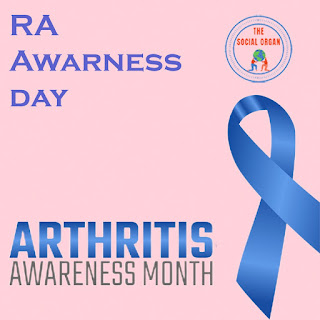Why Awareness towards Rheumatoid Arthritis is important? Article on Rheumatoid Arthritis by The Social Organ
Rheumatoid Arthritis Awareness Day: Understanding the Chronic Condition
Rheumatoid Arthritis (RA) is a chronic autoimmune disease that affects millions of people worldwide. On the second Thursday of February, people come together to raise awareness about RA and the impact it has on those living with it. This year, Rheumatoid Arthritis Awareness Day falls on February 10th, 2023.
RA is a complex disease that causes inflammation in the joints and surrounding tissues. The immune system mistakenly attacks the body's own tissues, leading to pain, stiffness, and swelling in the joints. Over time, this chronic inflammation can cause damage to the joints, making it difficult for those with RA to perform daily tasks and leading to disability.
RA is not just limited to the joints, it can also affect other parts of the body such as the eyes, skin, heart, and lungs. In fact, many people with RA experience extra-articular manifestations, which means they experience symptoms outside of the joints.
The exact cause of RA is not known, but research suggests that a combination of genetic and environmental factors plays a role in its development. Some of the risk factors for RA include smoking, obesity, and hormonal changes.
Diagnosing RA can be challenging, as the symptoms can be similar to other joint conditions. A doctor may use a combination of tests, such as blood tests, X-rays, and physical exams, to make a diagnosis. Once diagnosed, there is no cure for RA, but there are various treatments available to manage the symptoms and slow down the progression of the disease.
Treatment for RA usually involves a combination of medication, physical therapy, and lifestyle changes. Medications, such as nonsteroidal anti-inflammatory drugs (NSAIDs), disease-modifying antirheumatic drugs (DMARDs), and biologic drugs, can help reduce inflammation and relieve symptoms. Physical therapy can help improve joint function and reduce pain, while lifestyle changes, such as maintaining a healthy weight, can help reduce the impact of RA on the joints.
Living with RA can be challenging, as it affects not only the physical health of a person but also their mental and emotional well-being. People with RA often experience depression, anxiety, and other mental health conditions as a result of the chronic pain and disability associated with the disease.
It is important to note that RA affects people differently, and each person's experience with the disease is unique. Some people may experience severe symptoms, while others may have mild symptoms that come and go. This variability makes it difficult to predict how RA will progress and what the future holds for those living with the disease.
The impact of RA on daily life can be significant. People with RA may have difficulty performing routine tasks, such as bathing, dressing, and cooking, due to joint pain and stiffness. They may also struggle with employment, as the symptoms of RA can make it difficult to work. In some cases, RA can even lead to disability and the need for long-term care.
Despite these challenges, many people with RA are able to lead fulfilling lives with the help of medical treatments, physical therapy, and support from friends and family. There are also support groups and organizations that offer resources and support for people with RA, as well as their caregivers.
In conclusion, Rheumatoid Arthritis Awareness Day is an opportunity to raise awareness about this debilitating disease and the impact it has on those living with it. By educating the public about RA, we can help reduce the stigma associated with the disease and improve the quality of life for those living with RA.




Comments
Post a Comment
Please do not enter any spam link in the comment box.